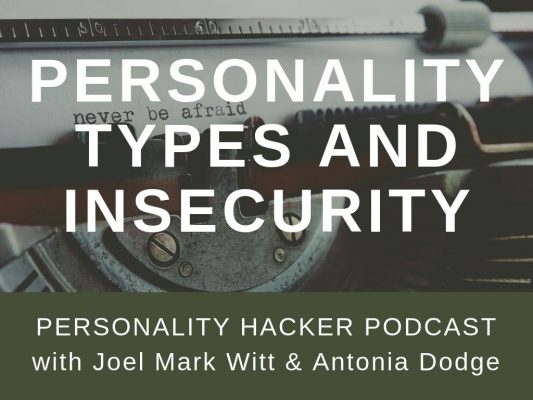Download Episode Here – right click link and select “Save Link As…”
In this episode, Joel and Antonia talk about how insecurity shows up in different personality types.
In this podcast you’ll find:
To subscribe to the podcast, please use the links below:
Subscribe with iTunes
Non-iTunes Link
Soundcloud
Stitcher
Google Play
Spotify
Radio Public
PlayerFM
Listen Notes
If you like the podcast and want to help us out in return, please leave an honest rating and review on iTunes by clicking here. It will help the show and its ranking in iTunes immensely! We would be eternally grateful!
Want to learn more?
Discover Your Personal Genius
We want to hear from you. Leave your comments below…



Share:
Podcast - Episode 0273 - Root Causes Of Insecurity
Podcast - Episode 0275 - Taking A Break From Personal Growth
20 comments
Another very interesting topic and podcast. I wanted to float an idea/theory that waa bouncing around for me while listening to this and the previous podcast as far a how type influences insecurities, or it may just be a bit of a reframe if I was following everything correctly. Also it could be biased towards a data point of just me extrapolate outward, so I would be curious if it rings true for others and if it fits with what you Antonia and Joel were getting at.
Do you think that in general the form of ones insecurities tends to be based off of your driver function (I suspect this is what you were getting at with the FIRM model…and I think in this application it makes more sense to me than it did to in the earlier podcasts about it. How the functions led to the fixations I got, but I strongly identified with 3 out of the 4 so couldn’t really one was supposed to be more significant, but it is the one that pushes your insecurity buttons that gives it a lot more power) and the what they get applied to and how much they matter is determined/is influenced by the rest of your cognitive stack? Life experiences of course would of course shape what the end result looked like greatly for everyone, but that in general do you think this is a pattern that might hold?
To use myself as an example. I am an ISTP and my driver introverted thinking makes competence a exceedingly important to me and most all of my insecurities can be tied back to that is some form or another. In general for both my introverted thinking driver and extraverted sense co-pilot any insecurities that come up are not really what I would call insecurities, they tend to be rational concerns/warnings that I trust and should indeed pay attention and/or take action on. When using either or both it is extremely necessary to know my own level of skill and competence for any task and have realistic assessment of the quality/reliability of a output and be able to communicate it.
For the my 10 year old introverted intuition, I can still pick up on clues of when it is more or less reliable and know what sort of things it is better and worse at but still have to be more vigilant checking what it tells verify whether or not the pattern it sees is real/correct and the conclusions reached based on it make sense. It can and does cause temporary insecurities but doesn’t generally lead to longer-term persistent ones.
My three year old extroverted harmony function on the other hand is the source of many insecurities based primarily on my lack of confidence and competence in using it well. These are the ones that are persistent and that I can’t solve or work through whether or not they are things that actually need worrying about or not…so far more impactful and exhausting to me.
Another interesting reflection for me was that my shadow functions despite using them less and being less skilled with them really aren’t sources of insecurity for me. An unexpected silver lining there as I got to thinking more about it.
Hi Ladies! (Jessica and Seely) Your comments are really validating for me as I work with parents who have kids of your types. Jessica your mom does sound like ESTJ and I find they can do the most damage to “unicorn kids” who don’t fall in step with societal expectations. I recently did a webinar on the topic: Parenting a Unicorn:https://johnnysambassadors.org/ja200814 Would love to hear your feedback. Because of their sensitivity and not fitting in with societal expectations INFJs are shown to be #3 in suicides according to MBTI stats. I used these stats in my presentation and I want to alert parents (especially ESTJs) that their child’s sensitivity should NOT be taken lightly! I loved what both of you said about responding quickly in the moment. For Jessica that is Se, but for Seely it is Te. They are different functions, but both require some sort of action in the immediate situation. I always advise parents to give their INXP’s time to process and maybe even keep a two way journal where both parent and child can express their feelings.I also wrote a book for parents (and individuals) you can find on Amazon: Your Child’s Inner Drive: Parenting by Personality from Toddlers to Teens. I have all sorts of case studies of children with all 16 types at all ages of development and what to look out for.
Wow Michael! I had so many aha moments reading your comments! I work with the parents of INTPs and I feel for you guys! I have an ISTP daughter (I am ENFJ so Fe is my driver). She is the reason I started doing what I do! I couldn’t expect her to be like me and know how to show gratitude, express her feelings, approach conflict. I love the ways you describe that helped you to build your confidence! I recently did a webinar on Parenting a Unicorn: https://johnnysambassadors.org/ja200814 and I had all the I N/S T/F P’s in mind as the unicorns who don’t quite fit the norms of society. The gal who created this organization, Johnny’s Ambassadors had a brilliant INTP son who became addicted to drugs and took his own life in college. She said he used to get physically sick before giving presentations. at school. I would welcome your feedback of my presentation as well as any other helpful tips for parents who are parenting an INTP. Here is my YouTube video for parents who have first tested their child as INTP. https://youtu.be/VW68ytLiJdk
Here is the link to the webinar: https://johnnysambassadors.org/ja200814
Hi Kris! Thanks for your comments! I recently taught a webinar entitled Parenting a Unicorn, catering to all the IN/ST/FP’s out there. I agree with your comments about insecurities for Fi and Ti types. In Myers Briggs stats Fi and Ti types make up #1,2 and 4 in regards to suicide. Hearing you so eloquently talk about your insecurity helps me to understand even more, what Fi and Ti types are going through. The gal who sponsors the organization Johnny’s ambassadors had an INT son who became addicted to drugs and took his own life in college. He was brilliant and well liked. Here is the link to the webinar if you are interested. I would love and value your feedback. https://johnnysambassadors.org/ja200814